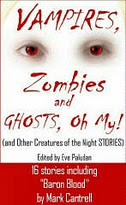Genesis of a created writer
In the beginning there was a warbling screech and a cry of ‘it’s crashed again!’ So the humble ZX Spectrum created literary life. Mark Cantrell confesses all – almost
THIS is where it all began.
Kind of. I’ve left it all behind now, of course, so it’s probably more apt to say this is where it ended up. Where it led is another matter entirely – and I am happy to say that the journey is far from over. I remain curious as to where the road will take me.
Still this is about beginnings, and it is a curious thing to say that it was a little black box that got me started as a writer and a journalist. In those days, such pursuits were ill-formed dreams – not even seedling aspirations – but they’d lurked at the back of the mind, largely ignored, as I endeavoured to learn the tricks of crafting computer games on the ZX Spectrum home computer.
That’s right, the ZX Spectrum: the one with the squidgy rubber keyboard, the minuscule 48K of memory and the eight colour TV display (colour clash anyone?), with games that loaded from a tape deck. Bless that screech! Yes, I was a teenage near-mutant computer geek.
Just for comparison, I’m writing this on a notebook computer less than half the size of my old faithful Spectrum. Yet is has 1GB of memory, a 32GB drive, an on-board screen and is running Windows Vista. As if I needed reminding of how technology has so rapidly changed, well I hold it in my hands. The nature of the digital beast, and its ongoing irony, is that for all we slobber over the latest kit – it is always a slice of techno-history we hold.
History can linger, of course, and it’s not always nostalgia. Not always, but in this case perhaps a well-earned tad. Courtesy of the magic of emulation, I can – if I choose – boot up the Spectrum and play some of those classic games that spawned the gaming world not as we quite know it today, but certainly its formative primordial ocean. For instance, ancient gems like Jet Set Willy, Knightlore, Horace Goes Skiing, Avalon, Dragontorc and… well, the list could go on and on and on. If I was feeling particularly narcissistic I could play my own games.
Thanks to the Internet and the wonders of emulation, not to mention the dedication of old tech and gaming enthusiasts, practically the entire opus of Spectrum games and cultural heritage is preserved – my own included – along with a wealth of machines historical.
The old Spectrum keeps varied company in the digital vaults of the Internet mausoleum-come-museum: its arch rival the Commodore 64 can be found there, along with the BBC Microcomputer, their successors the Atari ST and Commodore Amiga, and a host of game consoles that led to today’s Xbox and Wii.
My place in this pantheon of past machines, and the programming of yesterday, barely merits a footnote within a footnote, but still it’s kind of pleasing to know there’s a little part of me residing in this living archive of cultural history. If nothing else, it’s a curiosity to roll around the tongue.
It all started in the mid-1980s with that little box of tricks affectionately known as the ‘Speccy’. This discrete black box formed an introduction to computing for many people. I was a relative newcomer, as I got hold of one around two and a half years after its release. It arrived in my life as an unexpected Xmas present in 1984. I think it’s fair to say I haven’t looked back, though as a result I still have no idea where I left my life. Too distracted by all those – for the day – snazzy graphics, I guess.
Of course, my initial forays were in games playing. I had no idea that it was going to end up playing an important part in shaping my life way beyond the ultimate obsolescence of the technology. Whether that is for good or bad is another matter: the jury is still out on that one.
When I discovered text adventure games, that’s when the door opened to my future life in letters, because I didn’t remain a consumer of such games. For all that I enjoyed the sense of ‘exploration’, the challenge of working out the puzzles and the ‘plot’, together with the aura of atmosphere and imagination conveyed by the textual descriptions (in the better ones), I was never that great an adventure player.
I lacked the patience to see many to conclusion; instead I was drawn towards writing and creating my own. Now, that’s a strange admission, because far more patience and forethought and sheer creative grit was required to create an adventure than play one. In that respect, it’s very much like creative writing with short stories and novels.
Nevertheless, it wasn’t long before I began to dabble with creating my own games for the ZX Spectrum. So began the long, lonely road that has led all the way to these very words.
Like a lot of people, I had no idea what I wanted to do as I passed through school and stumbled headlong into the ‘real world’. Computer games seemed as good a thing to do as any. There was a time, back then, when I figured that what I wanted to do was make a career in computers. Not IT per se but computer gaming and the adventure kind at that. I’ve always had a creative streak and this was one outlet for that artistic urge, but in the end it proved a stepping stone to a journey rather than any kind of destination.
That’s just as well, really, because there was no more a future for the home-coding equivalent of the struggling novelist than there was for adventure games themselves. By the time this run through adventure-land reached its conclusion, I’d found new things, but I ended my involvement with a solid sense of achievement rather than a wistful ‘I could have been a contender’ kind of sigh. Indeed, my last game proved to be an award-winning little number.
So plot-wise, it might have been something of a blatant Alien rip-off, but it got good reviews and was something of a technical achievement that I believe was unique among its peers. In those days, the ‘stars’ of adventure writing, such as Level 9, used their own in-house development systems and were seen as being at the peak of technical capability in the adventure field. Those like me, who used Gilsoft’s commercially available Professional Adventure Writer (PAW) to develop and program their games, were very much seen as the poor cousin. Certainly, the prevailing view was that PAW et al was unable to produce the goods quite like a Level 9, so they were perceived as rather second rate almost by definition among publishers.
Not a view that was held by a considerable number of gamers, however, and plenty of games were produced on PAW, its predecessor The Quill, and rival systems such as the Graphic Adventure Creator (GAC), to show that great games could be created this way. On that score, I believe I can objectively say that I did create some worthy games, and my little ‘cottage industry’ of home-grown, self-published mail-order games found some very satisfied customers.
Alas, if one were to consider the pantheon of such games, mine came somewhat too late to be embedded in that cultural ‘legacy’, but they are at least out there on record. Many of the technical features I programmed into Diablo! – my ‘grand finale’ – were strictly speaking unnecessary for the game-play, but they did help to set it apart and show what PAW could do.
Those features mean little now, of course, but I used PAW to program the game with commands to list exits, to create an ‘oops’ command distinct from a ramsave, and – more daringly – I used multiple characters. None of this sounds like much, but in Diablo! you could change characters in mid-game and order the others to follow your current ‘identity’. These were features that had not hitherto appeared in a game created with a commercially available development tool.
Many of these features had appeared exclusively in the games created by the leading lights of adventure design teams. So, yeah, it was rather a satisfying achievement. And it was nice to get an acknowledgement of this, not just in review-terms – but with an award.
Diablo! won a ‘Golden Shield Award’ for the Best Mail Order Adventure of the Year in April 1990. Okay, so it involved no glitzy awards ceremony, and it wasn’t exactly earth-shattering, but I was chuffed. It was a nice way to say farewell to a completed stage of my life.
After Diablo! I felt there was nothing more to do in the ‘art’ as it were; anything further would just have been a tried and tested repeat of my earlier successes. Time, therefore, to move on. The game was over. I suppose you could say that I had won.
On the back of that award, Zenobi Software – itself an award winner in several categories – picked up my games and sold them on my behalf. By then, I was due to go on to university, so the royalties were a welcome boost to my meagre student funds. It was the final icing on the cake, a satisfying way to say farewell to my incarnation as a games developer, and a herald of my evolution into a ‘coder’ of words.
My first forays into writing wouldn’t have happened without the after-effects of Speccy gaming. For one thing, it began the development of my creative use of words – all those textual descriptions – but as my Spectrum chrysalis began to slough clear of the ‘new me’ gestated beneath, it provided the initial raw material to craft my new-found writing habit.
To begin with, I used my new-born word-craft to share my hand-me-down games-craft. My first articles were a series of ‘how to’ programming features, some of which appeared in Your Sinclair magazine. An abandoned idea for a game also provided the initial ready made plot for my first short story – an exercise in creative writing but also an important first step. So, I progressed.
Even in the small enclave that was the adventure world of the time, my achievements were nothing spectacular, but they were special to me. And, yes, that successful episode led on to what I have become today – a writer and a journalist. So was born my literary life. The story continues, though I’m probably still a geek.
The Menu Of Making
Diablo! (1989)
Best mail order adventure of 1990
Spectrum 48K & 128K versions
When a supposedly lost research ship mysteriously re-appears on its scheduled flight path, it refuses to answer any hails. Your team is sent aboard to find out what happened. Something seriously unpleasant is lurking on board and the last thing you want is for it to reach Earth.
Links: On World of Spectrum | Your Sinclair Review
Project NOVA (1988)
Spectrum 48K only
In an interstellar war, humans have developed a star-killing weapon to win the conflict once and for all. There’s just one snag, the aliens have captured the research station and seized the project. It’s up to you infiltrate, capture the data, and destroy the station before the aliens can exploit the star-killer.
Links: On World of Spectrum
Jester Quest (1988)
Spectrum 48K & 128K versions
So Jeremy was a terrible jester but since his was the only gig in town he felt pretty smug about job security. Then a new joke-meister turned up and Jeremy was out on his arse. Unemployed, despised, and frankly not too happy about, he set out upon his quest to find the secret of laughter and take back his job. Terrible jokes and savagely flat humour is never far away.
Links: On World of Spectrum
The Gods of War (1987)
Spectrum 48K & 128K versions
Britain in the aftermath of a nuclear holocaust is a divided land on the brink of a terrible war. Free kingdoms of men in the north have long forgotten the history of their land and have come to worship old nukes as avatars of their Gods. Meanwhile in the south, the land is conquered by an army of ’Mutts’ – the mutant descendants of those who lived in the ancient ruins. Technologically savvy, the Mutts are bent on conquering the neo-iron age north. So you must endure a hard quest into the south and find the secrets of the Gods of War.
Links: On World of Spectrum
ALL of the above games were originally sold by the author through mail order under his label ’Nebula Designs’. Later, Zenobi Software published them. These days, they can be downloaded to play on Spectrum emulators.
More on Zenobi Software:
World of Spectrum
Adventureland
BAF’s Guide to Interactive Fiction
Old Spectrum Mags:
Crash Online
Sinclair User
Your Sinclair the Rock ‘n Roll Years
Sources of Information & Games:
Adventureland
World of Spectrum
BAF’s Guide To Interactive Fiction
ENDS
Mark Cantrell,
Manchester,
17 November 2007
Copyright © November 2007. All Rights Reserved.
CATEGORY: PERSONAL




























0 comments:
Post a Comment